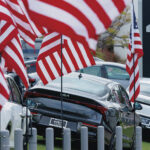Trump’s tariffs cast doubt on Hawaii vehicle sales forecast



Hawaii’s auto dealers ended 2024 down 3% in sales and were expecting a rebound this year until the enthusiasm was abruptly halted when President Donald Trump announced 25% tariffs on foreign auto imports and auto parts this week.
The Hawaii Automobile Dealers Association represents 71 new-vehicle sellers across the state that “are concerned there could be higher prices in Hawaii,” said Melissa Pavlicek, the association’s executive director.
The dealers remain uncertain how Trump’s tariffs will affect both them and potential buyers, including questions over whether the tariffs also will apply to foreign vehicle companies that also have U.S. manufacturing plants.
How Hawaii consumers respond to Trump’s promise of a new round of tariffs represents one of the biggest unknowns for Hawaii’s auto dealers, Pavlicek said, such as whether they’ll buy now before prices rise or hold off until the fallout from tariffs settles down.
Since Trump’s announcement, as Pavlicek put it, dealers have been wondering “whether this will increase the likelihood that customers will rush to buy a vehicle, or will they put a pin in it? It’s not really known yet.”
Other questions remain, such as how the latest shipment of vehicles en route to Hawaii that have yet to arrive on dealers’ lots will affect the overall market, meaning whether pre- and post-tariff vehicles of the same make and model will see different price points for consumers.
“It’s just too soon to say what the path is going to be,” Pavlicek said. “Will dealers have flexibility in negotiating prices? There is just a lot of uncertainty.”
Hawaii’s auto dealers, like the overall U.S. auto industry, was caught off guard because there was little to no mention of tariffs on foreign auto imports during the run-up to the November election or even in the early weeks after Trump moved into the White House.
Trump plans to announce additional tariffs next week.
He has said that tariffs, in general, will spur greater U.S. manufacturing that he believes will lead to more American jobs.
Even if true, the short-term impact on Hawaii’s auto market — and the overall U.S. economy — could be rocky and generate the risk of slowing sales and overall consumer spending.
Hawaii sits at the crossroads of the Pacific between Asian markets and the West Coast and could be particularly vulnerable to a trade war triggered by Trump’s ongoing tariffs on a variety of household goods, consumer electronics and critical building supplies that threaten to slow Hawaii’s construction industry, which has been a reliable driver of the local economy even through the COVID-19 pandemic.
On Thursday, The New York Times reported that global stock markets fell overall and auto stocks were hit the hardest.
U.S. allies once again blasted Trump for his tariff war, and several vowed to retaliate.
Nearly half of all vehicles sold in the United States and 60% of all parts used in auto factories are imported, according to the Times.
Daniel Roeska, an analyst at Bernstein, predicted that automakers could see costs rise by $6,700 per vehicle sold.
The fallout from foreign auto tariffs also could hurt U.S. manufacturers, such as General Motors, which also saw its stock fall.
Jim Reid, a research strategist at Deutsche Bank Research, said, “The more you listen to the current U.S. administration, the more you appreciate that they are prepared to sacrifice near-term market performance and economic growth if it’s required to meet their longer-term objectives.”
The Times also quoted Marc Giannoni, chief U.S. economist at Barclays, as saying that uncertainty over the direction of trade policy would encourage businesses to delay new investments in factories and hiring more workers.
“We expect businesses to hire less in the next few months,” he said. “Businesses that are pausing the investment decision are likely also to pause the hiring decision. So we see a lot of reduction in demand for labor.”
Flavio Volpe, president of the Auto Parts Manufacturers’ Association of Canada, called tariffs “a really blunt instrument.”
“One million cars in Canada a year are made by American manufacturers with 50% American parts and 55% of American raw materials, and he’s ready to push them off a cliff to make a point no one understands,” he said.




